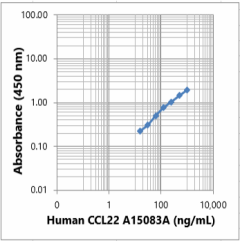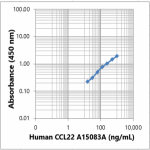- Clone
- A15083A (See other available formats)
- Regulatory Status
- RUO
- Other Names
- Macrophage derived cytokine (MDC), Small inducible cytokine subfamily A, member 22 (Scya22), stimulated T cell chemotactic protein (STCP-1)
- Isotype
- Mouse IgG2a, κ
- Ave. Rating
- Submit a Review
- Product Citations
- publications

-

Direct ELISA showing purified anti-human CCL22 (MDC) (clone A15083A) bound to plate-immobilized recombinant human CCL22 (MDC) protein (Cat. Nos. 584902 and 584904). The wells were incubated with serially diluted primary antibody at room temperature for 2 hours in 1% BSA-PBS, followed by incubation with HRP Goat anti-mouse IgG (Cat. No. 405306). TMB High Sensitivity Substrate Solution (Cat. No. 421501) was used for detection. Absorbance was measured at 450 nm. -

Adherent peripheral blood mononuclear cells (PBMC) were cultured (3 days) with Recombinant Human GM-CSF. 1X Monensin (Cat. No. 420701) was added for the last 4 hours of culture. The cells were harvested and stained with Zombie Violet™ Fixable Viability Dye (Cat. No. 423113). Then, cells were fixed and permeabilized with Cyto-Fast™ Fix/Perm Buffer (Cat. 426803) and then intracellularly stained with purified anti-human CCL22 (clone A15083A) (left) or purified mouse IgG2a, κ isotype control (right) followed by PE anti- mouse IgG. The cells were stained with anti-human CD206 APC. Data shown was from gated live cell population.
| Cat # | Size | Price | Quantity Check Availability | Save | ||
|---|---|---|---|---|---|---|
| 611952 | 100 µg | 235 CHF | ||||
CCL22 was initially cloned from human activated macrophages by random sequencing of cDNA clones. CCL22 was described originally as a constitutively produced, thymus-specific chemokine engaged in the recruitment of T cells. CCL22 and CCL17 bind to CCR4, and both chemokines share similar in vivo expression patterns and are closely linked on human chromosome 16. Nevertheless, they are only 37% identical at the amino acid level.
CCL22 has been associated to different diseases such as allergen-induced lung inflammation, atopic dermatitis, and lymphoma. High levels of CCL22 have also been detected in the CNS in multiple sclerosis (MS) and experimental autoimmune encephalomyelitis (EAE). In addition, CCR4+ T cells have been linked to endotoxic shock, rheumatoid arthritis, T cell lymphoma, and autoimmune diabetes. Recruitment of Tregs to human cancers producing CCL22 suppresses tumor-specific T cell immunity and contributes to tumor growth. In the context of central nervous system, CCR4 is expressed in astrocytes, microglia, and in hippocampal neurons. Most recently, CCR4 and CCL22 have been detected in the anterior hypothalamus/preoptic area, a key region involved in thermogenesis. In this sense, it has been described that CCL22 is a prostaglandin-dependent pyrogen, acting in the anterior hypothalamus to induce hyperthermia via activation of brown adipose tissue.
Product Details
- Verified Reactivity
- Human
- Antibody Type
- Monoclonal
- Host Species
- Mouse
- Immunogen
- Human Recombinant CCL22 Protein
- Formulation
- Phosphate-buffered solution, pH 7.2, containing 0.09% sodium azide
- Preparation
- The antibody was purified by affinity chromatography.
- Concentration
- 0.5 mg/mL
- Storage & Handling
- The antibody solution should be stored undiluted between 2°C and 8°C.
- Application
-
Direct ELISA - Quality tested
ICFC - Verified - Recommended Usage
-
Each lot of this antibody is quality control tested by Direct ELISA. The optimal concentration of this reagent for the specific application and the experiment design should be established by the end-user. For intracellular flow cytometric staining, the suggested use of this reagent is ≤ 0.06 µg per million cells in 100 µL volume. It is recommended that the reagent be titrated for optimal performance for each application.
- Application Notes
-
Clones A15083A and A15083D do not block each other.
Clone A15083A does not block the reference clone T51-719.
Clones A15083A and A15083D have shown good staining in both Cyto-Fast™ Fix/Perm Buffer Set & True-Phos™ Perm Buffer. - Additional Product Notes
-
This product is intended for sandwich-based immunoassay development on various assay platforms requiring antibody pairs. This antibody (clone A15083A) could function as a capture antibody when paired with Biotin anti-human CCL22 (MDC) antibody (Cat. No. 694405) (clone A15083D) as the detection antibody and using Recombinant Human CCL22 (MDC) protein (Cat. Nos. 584902 and 584904) as the assay standard.
- RRID
-
AB_2941604 (BioLegend Cat. No. 611952)
Antigen Details
- Structure
- Chemokine
- Distribution
-
Macrophages, NK cells, IFNγ stimulated human keratinocytes, thymic epithelial cells and intestinal epithelial cells
- Function
- CCL22 induces the migration of CCR4 + Th2 cells, Tregs, DC, and NK cells. It is induced by LPS and CD40 antibody in macrophages. It is upregulated by Th2 cytokines (IL-4 and IL-5) and downregulated by Th1 cytokines (IFNγ).
- Interaction
- Dendritic cells, NK cells, Th2 cells, T regs, CLA+ skin-homing memory/effector T cells
- Ligand/Receptor
- CCR4
- Biology Area
- Cell Biology, Signal Transduction
- Molecular Family
- Cytokines/Chemokines
- Antigen References
-
- Godiska R, et al. 1997. J Exp Med. 185:1595-604.
- Imai T, et al. 1998. J Biol Chem. 273:7118-22.
- Yamashita U and Kuroda E. 2002. Crit Rev Immunol. 22:105-14.
- Horikawa T, et al. 2002. Int Immunol. 14:767-73.
- Mailloux AW and Young MRl. 2009. J Immunol. 182:2753-65.
- Dogan RN, et al. 2011. J Leukoc Biol. 89:93-104.
- Osborn O, et al. 2011. Cytokine. 53:311-9.
- Gene ID
- 6367 View all products for this Gene ID
- UniProt
- View information about CCL22 on UniProt.org
Other Formats
View All CCL22 Reagents Request Custom Conjugation| Description | Clone | Applications |
|---|---|---|
| Purified anti-human CCL22 (MDC) | A15083A | Direct ELISA,ICFC |
| PE anti-human CCL22 (MDC) | A15083A | ICFC |
Compare Data Across All Formats
This data display is provided for general comparisons between formats.
Your actual data may vary due to variations in samples, target cells, instruments and their settings, staining conditions, and other factors.
If you need assistance with selecting the best format contact our expert technical support team.
-
Purified anti-human CCL22 (MDC)

Direct ELISA showing purified anti-human CCL22 (MDC) (clone ... 
Adherent peripheral blood mononuclear cells (PBMC) were cul... -
PE anti-human CCL22 (MDC)

Adherent peripheral blood mononuclear cells (PBMC) were cult...
 Login / Register
Login / Register 







Follow Us